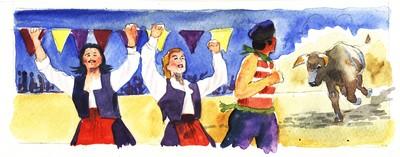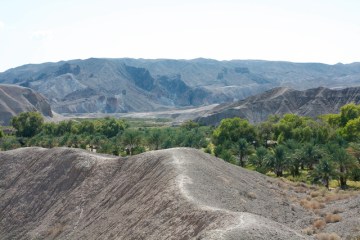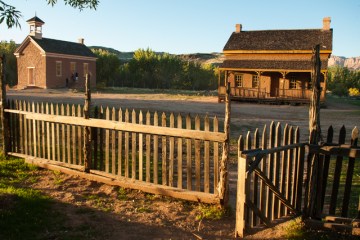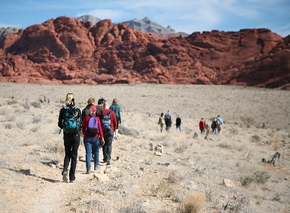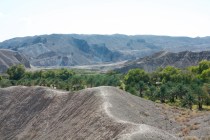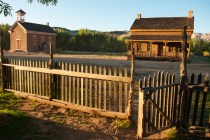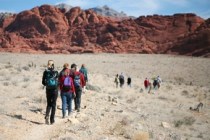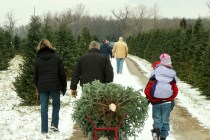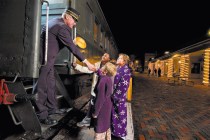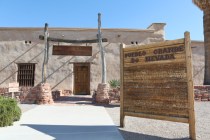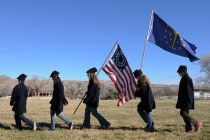Celebrate Basque culture with June festivals
Basque people arrived in the American West on a wave of emigration from their homeland in the Pyrenees Mountains between Spain and France that began in the 1860s. Many arrived to tend sheep on the lonely ranges of California, Nevada, Idaho, Utah and Wyoming, a traditional occupation in the old country.
Explorers of remote areas in Nevada still spot the wagons with the curved tops that house the herders much of the year. Never far away, the huge flocks of sheep spread over rugged uplands with the herder on horseback and dedicated dogs working the margins.
Off-season, you might spot the herders among the grizzled, weathered old men in some of the historic bars in Nevada's rural towns. They enjoy playing a hand or two of Solo and having a quiet drink with compatriots, often conversing in the old language. There are fewer of them now, as Basques leave the old ways to weave themselves into the fabric of modern life in Nevada.
Their colorful heritage lives on in Basque festivals scheduled in Winnemucca and Elko this month and in their flavorful food served at several restaurants in Nevada. The festivals feature music, dances, costumes, games, contests and food unique to the Basques.
Hearty Basque fare, often served family-style in large bowls, specializes in lamb, beef, chicken and shellfish dishes and beans richly flavored with garlic and onion, accompanied by sheepherder bread, usually baked in Dutch ovens. Guests often get whatever array of foods the chef feels like, in all-you-can-eat portions. For a true experience, begin with a Picon Punch, a deadly concoction best drunk slowly in limited quantities, and savor the house red wine with your meal.
Some dining rooms like the ones in Winnemucca Hotel, Gardnerville's historic Overland Hotel and Louis's Basque Corner in downtown Reno seat mixed parties at long tables. You'll share a table with whoever else waits for the next seating in these popular, often-crowded eateries. Since both Winnemucca and Elko boast large Basque populations, visitors find the largest variety of Basque restaurants there, each with three or four dinner houses. A couple more serve Basque meals in Carson City.
Basque festivals draw lively crowds. Get a sampling of Basque culture in Winnemucca next weekend, June 9-10. The local Basque festival centers on the events complex at the Humboldt County Fairgrounds. Expect plenty of music and costumed dancers with children and adults dressed in colorful traditional garb. Picnics and barbecues give visitors a chance to sample savory Basque dishes. For details, call festival organizers at (775) 625-1809.
Basques in the Elko area started their Euskaldunak Basque Club in 1959. They organized the first festival in 1964, attracting so many participants that it took on the title of National Basque Festival. The 43rd annual Elko National Basque Festival takes place June 30-July 2 at several locales, including the group's clubhouse, the Elko County Fairgrounds, the Western Folklife Center, the city park and downtown streets.
Events begin at 6 p.m. June 30, with dancers and game exhibitions until 8:30 p.m. At 7 p.m. the raucous "Running from the Bulls" begins downtown. Starting in front of the Stockman's Hotel, runners sprint ahead of stampeding cattle. To participate, runners must be "18 years old and sober," according to festival information.
Saturday's festival parade downtown attracts crowds. An afternoon of games, contests and dancing follows at the fairgrounds. During the day, a golf tournament and a 5K run occupy some participants. Many stop by the Western Folklife Center, where weekend activities include a photography exhibit showcasing Basque shepherds, a Basque-themed book signing, food contests, and workshops in sheepherder bread-making and storytelling.
On Sunday, a noontime meal in the city park features steak and lamb. Stick around in the afternoon for Basque games, dancing and handball, followed by a traditional dinner and fireworks that evening.
Margo Bartlett Pesek's column appears on Sundays.
MARGO BARTLETT PESEKMORE COLUMNS



